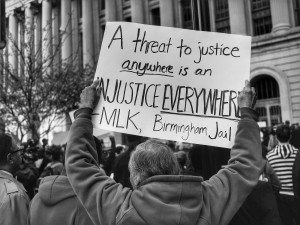You Can’t Make Change If You Don’t Show Up

By now, virtually everyone is familiar with the term “Black Lives Matter,” whether they understand or agree with its purpose or not.
The Black Lives Matter hashtag and corresponding movement opposing widespread racial imbalances have sparked a national dialogue that’s long overdue. There’s perhaps no greater indication of this movement’s need than the backlash earned from simply stating “Black Lives Matter.”
But it should be known that Blacks aren’t the only ones speaking up and calling out instances of social and systemic inconsistency within our white-oriented culture. More and more white individuals and groups are putting themselves on the frontlines as accomplices to racial justice and communicating directly with other whites on the everyday role and impact of racism.
The American Humanist Association (AHA) has joined this fight by recently becoming an affiliate with Showing Up For Racial Justice (SURJ), ), a national network of groups and individuals organizing white people for racial justice. Through community organizing, mobilizing, and education, SURJ moves white people to act as part of a multi-racial majority that seeks justice with passion and accountability.
Some may ask, “How does this relate to humanism?”
Humanism is about the inherent and equal significance of all human life. However, there is clearly a surplus of value and regard assigned to white lives, while that same consideration is denied to non-whites. Racial profiling, housing discrimination, mass incarceration, the wealth gap between white and non-white families, and disproportionately high unemployment rates among people of color are all evidence of the influence of racialized cultural prejudices, which no reasonable person can overlook.

Photo by 5chw4r7z via Flickr (CC BY-SA 2.0)
As humanists, social concern, critical inquiry, and empathy move us to recognize, contemplate, and push back against this inequitable status quo. The value of human life shouldn’t depend on racial affiliation. And because race still plays such a huge part in culture, we feel it’s important to tackle this issue head-on.
This means openly discussing whiteness and acknowledging that whiteness isn’t merely a reference to skin color. Whiteness describes a socially and politically constructed concept. It’s a relational description (with a European origin used to justify slavery) that only exists in opposition to other categories in the racial hierarchy. Whiteness defines itself by demarcating a separation from “others.” Whiteness is both a systemic and systematic ideology based upon beliefs, attitudes, and behaviors that results in unequal distribution of power and privilege and accords a higher regard for the intellectual, behavioral, and inherent value of those defined as “white.”
From this cornerstone of thought, this country has built a social and political history that’s ingrained racism into the very fibers of our social systems. While it’s true that our nation has undergone progress when it comes to race and race relations over the years, the national conversation remains impoverished for a few reasons.
For one, many operate under an illusion that “racial tensions” have intensified in recent years. But, as actor Will Smith stated recently in an appearance on The Tonight Show: “Racism isn’t getting worse, it’s getting filmed.” As a consequence of the advent of smartphone technology, hyper-surveillance, and growing numbers of those choosing to speak out about what’s always existed, societal recognition of racial inequalities has sharpened.
Second, oftentimes when discussing race, people remain in the dark about certain terms and meanings used to describe the realities of racism. Take the term “white supremacy.” Many think of it exclusively in terms of the Ku Klux Klan, or white nationalist neo-Nazi groups. Yes, the ideology is certainly present within those groups, but broadly speaking, white supremacy describes a philosophical system that influences society on political, economic, and social levels and supports the belief that those belonging to “white” human races are somehow naturally superior to those of other racial backgrounds. It’s important to note that white supremacy is comprised of habits, actions, and beliefs and that it goes beyond intent.
While you have “active” racists like white nationalists or those of that ilk, white supremacy more regularly relates to implicit biases, assumptions, and stereotypes that perpetuate inequality. White supremacy is intertwined with racism.
Third, it’s very difficult to break the false binary many have worked up in their heads about racism. In this vein, Standing Up for Social Justice seeks to expose the insidious, structural nature of racism and destroy the myth that racism is just some bad people doing bad things.
Whites have a tendency to distance themselves from accountability by continuing the narrative that if you’re a “racist” you’re also a bad person. Because people rarely see themselves as bad people, it allows whites to conclude they can’t possibly be racist. SURJ works to demystify and unpack the implications and effect of racism and white supremacy. What society needs is race consciousness not “colorblindness,” which functions as a way to ignore reality and rely on muteness towards problems related to race. In reality, it only exacerbates the problem.
Another common question may be, “Why are white people being singled out?” We can better understand this question by examining the work of other social justice groups like Men Can Stop Rape, an organization that educates and mobilizes men to positively redefine masculinity and increase awareness about pervasive beliefs and behaviors that harm women. They don’t “single men out” to belittle them or “blame” them. Rather, initiatives like this exist to emphasize the important role men play in recognizing, opposing, and extinguishing sexist values that many people uncritically accept and endorse.
Women and femme-presenting individuals continually fight for basic, equal rights and treatment in a society that routinely degrades their humanity. It is crucial that men use their social and cultural exemption from oppression that specifically targets non-men. Though the majority of violent acts against women are committed by men, the vast majority of prevention efforts are risk-reduction and self-defense tactics directed at women. The founders of Men Can Stop Rape shift the responsibility of deterring harm away from women by promoting healthy masculinity and proactive solutions to engaging men as allies.
This effort mirrors the mission of Showing Up for Racial Justice and the reason for using white allies to engage in anti-racism work.
SURJ envisions a society where, motivated by love, we struggle together for justice, human dignity, and a sustainable world. This is a humanistic goal. Humanism has roots in critical thinking and many who use the label humanist would say they are critical thinkers. However, it’s important to remember that humanism’s dedication to critical thinking shouldn’t just be applied to matters of religious faith and supernaturalism but also to racism and other harmful prejudices within our society that impede progress.
The AHA has become a collaborator with Showing Up for Racial Justice because we believe that identifying and denouncing inequality isn’t enough—we must also take action. For this reason, we encourage AHA members, affiliates, and unaffiliated humanists to get involved in SURJ’s organizing. If you’re interested in volunteering with SURJ, you can find a local chapter on their website or contact the organization directly and mention that you found out about it through the American
Humanist Association.
SURJ Development Director Kristen Brock-Petroshius says this about the importance of this work:
To achieve our vision of engaging seven million white people—3.5 percent of the white population—in racial justice organizing over the next decade, we need all of us all in—our hearts, minds, bodies, and spirits.
Our goal is two-pronged: to create positive change in the world as well as represent humanist values in our actions. This is a great opportunity to broadcast to the world that religious affiliation isn’t necessary for social responsibility and compassionate action. As we fight injustice, we also work to normalize humanism in society.
Living humanist values through compassionate activism is the answer to widespread prejudice and disparity. As poet and activist June Jordan said, “We are the ones we’ve been waiting for.”
